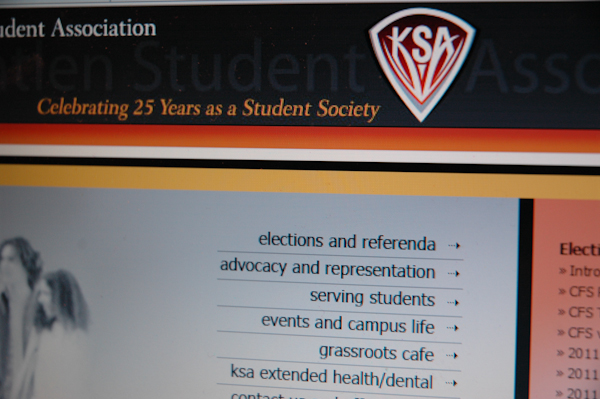Opinion: CRTC keeping Canada in tech stone-age
March 9, 2011 by Jeff Groat · Leave a Comment
At the beginning of February, the Canadian government ordered the CRTC to review its decision to allow companies to meter data usage on the internet and charge users based on the amount of data they use. The problem is the original ruling doesn’t make sense.
Data is not finite in the ways that resources such as drinking water are. Data is not something that a country or economy needs to produce, mine or refine. Data is not inherently valuable in itself, as diamonds or barrels of oil are. Data cannot be saved in times of plenty and used in times of scarcity.
Proponents of the metered data use the analogy of water. In countries where a flat rate is charged for a finite resource such as fresh water, this leads to a culture of overuse: people use as much water as they possibly can, simply because if they don’t, someone else will. It’s essentially a use-it-or-lose-it mentality that leads to waste and inefficiency.
In a way, data is the reverse of this. Unused data is inefficient and wasteful. Unused data represents an economy’s sluggishness. We can assume that the more information that’s flowing over the internet, the more valuable ideas are being exchanged and more economic growth can follow.
If the CRTC doesn’t realize that internet use will be the future of a global economy, it will put in place measures that will jeopardize any potential growth to come from inside Canada.
Technological connectedness should be a hallmark of Canadian culture. The CRTC should never again consider plans to meter use of the internet in any way.
KSA council divided on multipass
February 1, 2011 by Jeff Groat · 1 Comment
As students begin voting on a Multipass referendum this week, two members of the KSA council are concerned that the pro-Multipass position the KSA is taking is in conflict with the association’s duty to represent the student body.
Brad Head, the director of academic affairs, and Shanal Prasad, the director of finance, think the KSA should be taking the time to educate students not only about the benefits of the Multipass program but also of the downsides.
“In principle, should students vote on the U-pass? By all means, yes, they should decide if they want it or not,” said Prasad. “But the way it’s been brought up, I totally disagree with.”
Head agrees.
“I don’t think it’s a fair program, I think that we’re benefitting the minimal amount of students,” he said.
“We’re spending $5,000 to push the Multipass through. If students disagree with that, they are allowed a mere $250 dollars to do a ‘no’ campaign.”
Head thinks that the KSA should not be taking a stance on the issue of the Multipass. He thinks that a neutral stance would not only be more representative, but would also “allow for an informed vote, not a forced vote.”
Prasad asked, “Why would [the KSA] take a ‘yes’ position? You’re not really representing your membership.”
Matt Todd, the director of external affairs, has represented the KSA during Multipass negotiations with TransLink.
“The KSA’s job is to create programs and services that it thinks are in the best interest of students to help students make the best of their time to be successful,” he said.
“If we were to create a program and not believe that it’s a good program, that we believe students would want, then we would be doing a terrible job.”
As for the discrepancy in funding between the yes and no sides, Todd writes the idea of unfairness off, saying a no’ campaign hasn’t even been proposed.
“Nobody’s even come forward for $5, $250 or $5,000,” he said.
“If students were actually organizing against the Multipass and felt that this was unfair, then it would be a conversation worth having.”
He points out that the funding numbers aren’t set in stone and could change if need arose.
Prasad managed to stave off the Multipass referendum until March, but a student petition managed to return the vote to its original dates, coinciding with KSA elections. His intent was to take the time to make sure students at all four campuses had been given the facts about the Multipass proposal.
As it stands, Kwantlen students would pay the same $30 fee as other institutions in Metro Vancouver, but for lower levels of transit service that other institutions receive, he argues.
“If you’re getting a half-price bus pass, you’re getting a pretty kick-ass deal,” Todd said.
Todd doesn’t think that the service gap is any reason to vote against the Multipass. “You’re still getting a half-price U-pass,” he said.
Matt Todd says that if the Multipass passes in the referendum, the KSA will lobby the TransLink mayor’s council to increase funding for services in order to address the service gap.
On Friday, Jan. 28, a TransLink table was set up on Surrey campus to provide students with answers to any questions they may have had. According to TransLink, there are no existing plans to increase service to the neighbourhoods surrounding Kwantlen campuses until it can raise the money to pay for it.
Head and Prasad believe that Kwantlen students need to know that they aren’t getting the same service as, for example, students at UBC and SFU are getting.
2011 KSA elections first-ever online only vote
January 25, 2011 by Jeff Groat · Leave a Comment
When the polls close at noon on Feb. 6, this year’s KSA elections will be the first to have been conducted exclusively online.
Unlike previous elections, which occurred only on one day and involved physical ballot boxes and voting booths, voting will be conducted online from noon on Jan. 31 to noon on Feb. 6.
But there are concerns among KSA Executive Board members that the door for breaking the rules is wide open.
KSA Director of Academic Affairs, Brad Head, sees problems with the online voting system, predicting a lower voter turnout. “Many students don’t vote already… many students don’t go onto their myKwantlen account,” he said.
Head is also concerned about cheating.
Since voting traditionally took place at stationary voting booths in years past, computers that will now be used for voting are required to be “stationary.” In other words, candidates are barred from simply walking around campus with a laptop and asking people to vote.
KSA Director of Finance, Shanal Prasad, has similar concerns.
“There is so much potential for things to go wrong,” he said. “What if a group of people have a giant party and they have a laptop there and they get all their friends to come and vote?”
KSA Director of External Affairs, Matt Todd, said it’s also against the rules for a candidate to walk around and offer candy bars in exchange for votes, something that was just as likely under the paper-balloting system.
“We already live with that risk, we just have different packaging on the risk,” Todd said.
(The distribution of food and drink is a violation listed in KSA elections Regulations document on their website and candidates are held responsible for the actions of supporters. According to KSA regulations, “the candidate accepts full responsibility… that any offenses committed by campaigners shall be deemed to be offences committed by the candidate.”)
As for benefits, Todd said it is much cheaper to put the vote online. And because it is cheaper, it is possible to run the election over more days and, he hopes, capture more voters. As well, there are no “bad ballots” online, and tabulation of votes is automatic.
This year, there are 59 candidates running for various positions in the KSA. This is the largest number of candidates to have run in a single election at Kwantlen. “It means people are paying attention and actually care enough to participate,” Todd said.
Here is a full list of candidates (link is to a PDF.)
Kwantlen event: Hello, Africa!
November 15, 2010 by Jeff Groat · Leave a Comment
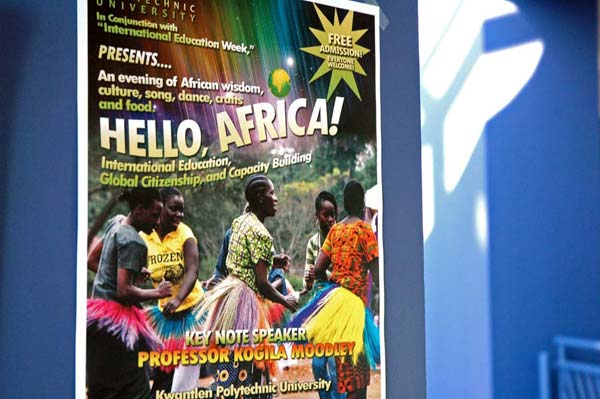
Hello, Africa! is being held at Kwantlen’s Surrey Campus on Monday, Nov. 15. The event will be “an evening of African words, wisdom, song, dance, drumming, crafts, food and drink.” Photo by Jeff Groat
Hello, Kwantlen, Africa’s calling.
Hello, Africa! kicks off International Education Week at Kwantlen on Monday and features a keynote address from UBC sociology Professor Kogila Moodley.
“This event came about as a result of myself and two colleagues going to Kenya this summer,” said Joan Nesbitt, who is part of Kwantlen’s criminology faculty and is an organizer of the gala.
“The three of us went to Kenya to look at the feasibility of setting up international field schools there,” she said. Part of the grant that paid for the trip to Kenya included a community dialogue session back at home, leading to Hello, Africa!
Moodley’s address is titled “Gandhi & Mandela: Reconciliation in Divided Societies” and is expected to touch on themes of building dialogue between local communities in the developed Western world and the continent of Africa, or the global south at large.
Nesbitt and her colleagues are in the very early stages of setting up international field schools in Kenya and Tanzania, where Kwantlen criminology or sociology students may be able to go on exchange.
Monday’s event is meant to highlight the importance of exchanges and of sharing educational resources between communities. It is sponsored by Kwantlen’s criminology department.
Moodley, according to the Hello, Africa! program, is professor of sociology at the University of British Columbia, where she was the first holder of the David Lam Chair in Multicultural Studies.
Audio: Sonic poet paints scenes with sound
November 6, 2010 by Jeff Groat · 2 Comments
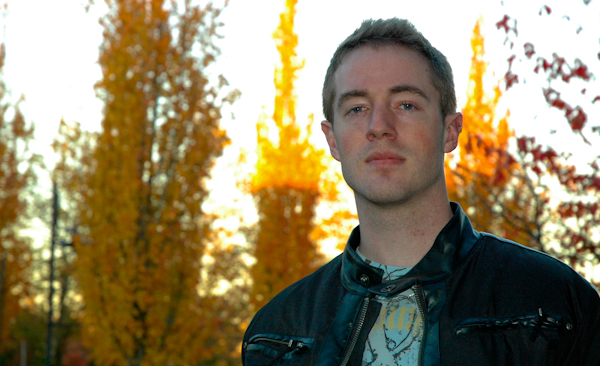
Kwantlen creative writing student Mark Funston crafts new sounds using old poetic forms. His style of sonic poetry is a cousin of slam poetry, and Funston likes to add his own twist using traditional forms such as the villanelle or the triolet. Each has a unique internal rhyme scheme that adds to the “sonic” qualities of his work. Photo by Jeff Groat
[audio: SonicPoetry.mp3]
Ever since the 2010 Olympic Winter Games in Vancouver, people have been tuned into the world of contemporary poetry after Shane Koyczan’s “We Are More” performance. Kwantlen Student Mark Funston isn’t a slam poet, but his work is like Koyczan’s in that its author’s voice breathes it to life.
Sonic poetry is the name Funston uses for his work, and it is phonetically charged with both old and new style. By playing with classical poetic forms, with rigid rhyme schemes and structures, he is able to add an extra layer to his work.
Funston has completed his minor in creative writing at Kwantlen, but is not considering launching a career as a professional poet.
Negotiations over, U-Pass program to go to vote
November 6, 2010 by Jeff Groat · 1 Comment
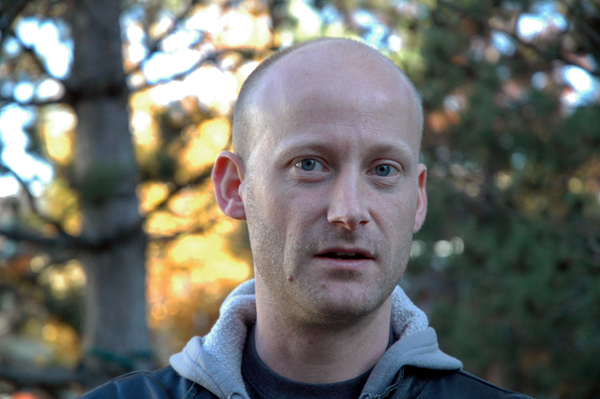
KSA director of external affairs, Matt Todd, is concerned that students will need to wait even longer for a U-Pass. Todd hopes the U-Pass referendum will be held in February. Photo By Jeff Groat
A week ago, the Kwantlen Student Association postponed a referendum on the U-Pass as negotiations hadn’t reached a conclusion before a target date set by TransLink set. This week, the negotiations were finalized, pending working out details in a couple areas.
The result is a recommendation that students vote in February 2011 to accept or reject a U-Pass.
One area that still needs to be worked out is the wording of the contract to include Adult Basic Education (ABE) students in the U-Pass program. ABE students are mature students who did not graduate from high school but are upgrading some education to continue in university education. Originally, these students were not included in the U-Pass program, since ABE credits do not count as regular full-time credits like most other courses do.
Another, more finicky area, concerns students who withdraw from courses after they receive a U-Pass.
Hypothetically, it may be possible for a student to register for one class, receive a U-Pass, then withdraw from that class. In this case, TransLink would charge Kwantlen an additional $50 to make up the difference between a U-Pass and a regular one-zone buss pass, as this person would no longer be considered a student at Kwantlen.
The problem lies in the fact that Kwantlen does not have the means to collect this fee from the student, and is wrestling with the question of whether a student can be prevented from registering for classes before paying back the institution.
Matt Todd, the Kwantlen Student Administration’s director of external affairs, said, “the university has this dilemma of would we really prevent somebody from furthering their post secondary education because they didn’t pay for their U-Pass?”
At the table, Kwantlen failed to negotiate an increase in the exemption limits from one to five per cent, something that Kwanten believes is a problem unique to the Fraser Valley.
“Because most of those students [in the valley] go to Kwantlen, we feel that this is a problem that is special to Kwantlen,“ Todd said.
The student association expects roughly five per cent of students will want to be exempt from paying for and using their U-Pass, because of a lack of reliable and frequent transit access in some communities of the valley. These students would be forced to pay for a U-Pass that they are likely to not use.
“We don’t think that’s fair to students,” Todd said.
According to Todd, there are two options: “Better service or exempt those students.”
If approved, the U-Pass system will be a two-card system for at least two years or until TransLink implements a smart-card electronic fare system.
This means the KSA will incur the costs of redesigning new student ID cards that include some features required by TransLink, as well as the U-Pass card itself. There are other expenses for implementing the U-Pass, such as hiring staff to deal with the new program, training staff and buying new software. All these costs are paid by participating schools and only an increase in student fees would pay for this.
“They have come to the table, they’ve made a big investment, but I don’t think [the province] realized how much it was going to cost,” Todd said.
Todd is recommending that the referendum be held in the first week of February next year.
Video: Anosh Irani has a way with words
October 27, 2010 by Jeff Groat · 1 Comment
Indian-born author Anosh Irani appeared at this year’s Vancouver International Writers and Readers Festival, and read from his new novel, Dahanu Road. The reading took place at an event called Home Grown, which featured several Vancouver-based authors and poets. Irani moved to Vancouver from Mumbai, India in 1998 to study creative writing at UBC. In 2009, he was writer-in-residence for Kwantlen’s creative writing program. He has has received a number of Canadian literature awards for his plays, novels and poetry.
Video by Jeff Groat and Amanda Punshon
October 12, 2010 by Jeff Groat · Leave a Comment It’s time to raise the minimum wage in B.C. — the province’s students have it hard enough. Last month, Carole James, leader of the provincial NDP and the official opposition, raised the notion of increasing the minimum wage from $8 an hour to $10. Such a raise would take the province from having the lowest minimum wage in Canada to having one of the highest. (The minimum wage in B.C. hasn’t been increased since 2001.) It’s important to note that Metro Vancouver has one of the highest costs of living in the country, meaning that the dollars spent on rent, groceries and utilities don’t go nearly as far as money being spent in other major Canadian cities. None of this is lost on Canadian students. Tuition costs continue to climb (up about four per cent this year), as most full-time students continue to work part-time or take out student loans in order to support themselves. It is a common sight to see three, four or five students crammed into a small apartment or suite in any neighbourhood in Metro Vancouver, sharing the rent in one of the most expensive markets in the country. Of course, one of the biggest arguments against increasing the minimum wage is the fact that the rise in operating costs will hit smaller businesses hardest. Opponents to the increase claim this would result in fewer jobs in the province, and in effect, make circumstances worse than they already are. The only problem with this argument is that it is an all-too-common refrain of right-wing think tanks such as the Fraser Institute, backed up with questionable data and liberal interpretations of Statistics Canada reports. That’s not to say that there will never be adverse effects of an increase to the minimum wage, but the effects of keeping it at a Canada-wide low of $8 are adverse enough. Given the fact that, according to Stats Can, 59 per cent of minimum wage workers are 15 to 24 years old — a large portion of whom are students and are the future cultural, political and business leaders of the country — it is time to consider this as a sound economic investment in our future. In fact, Ontario pays the highest minimum wage in Canada at $10.25 per hour, but remains as one of the top economic performers in the country. It’s time to keep up with the times and raise the minimum wage in this province. October 7, 2010 by Jeff Groat · 1 Comment Eva Botton is one of the lead organizers of Friends 4 Food, a vegan food provider at Kwantlen's Surrey Campus. Photo by Max Hirtz Friends 4 Food is not friends with Sodexo. The reactive Friends 4 Food was formed in opposition to what they see as “a corporate bully”, Sodexo, moving in as operators of Kwantlen’s cafeterias through what they say is an all-too-murky process. Friends 4 Food is run by a small group of criminology students and serves vegan food to students in the Surrey campus courtyard four days a week, offering an alternative to what F4F sees as overly expensive and unhealthy food, provided by Sodexo at Kwantlen’s cafeterias. In the first week of operations, F4F was shutdown by Fraser Health Authority and slapped with $615 in fines for various health code violations, but not before being warned by Kwantlen administration of the potential health violations and of not properly booking space in the courtyard at Surrey Campus. The idea was to serve vegan food by donation to students who don’t wish to spend their money at Sodexo. “We thought we’d call for a boycott, but we can’t really call for a boycott if we have no means for students to boycott it,” said Eva Botten, who is a lead organizer of F4F. Started as a research project for a criminology class, F4F organizers looked into the history of the company now running the cafeteria at the school. “So we’re trying to get [Sodexo] out,” Botten said. On the Surrey campus, there are other food options, such as the student-run Grassroots Café, but campuses in Richmond, Langley and Cloverdale only have Sodexo-run cafeterias. F4F has gained wide support from Kwantlen’s criminology faculty in its vocal protests against Sodexo on one side, but has been dealing with Kwantlen aministration and policy on the other. “In an era where there is so much student indifference or apathy, to have a student who is smart and politically engaged and have some political moxie, is a student to be celebrated,” said Hollis Johnson, the criminology professor who assigned the project. Johnson also harkened back to an incident over the summer when Emery Warner, another Kwantlen criminology student, was booted off campus for refusing to show identification while handing out leaflets protesting Sodexo’s (at the time) new place on campus. “Why would anybody get in trouble with the university and members of Sodexo for leafleting, handing out pieces of paper on a university, which to my mind is an open, public institution?” Johnson asked. “Does that mean that anybody who walks on campus who we don’t like what they look like, or have to say, have to identify themselves?” Joanne Saunders, Kwantlen’s Director of Marketing and Communications, said,”everyone is allowed to voice their opinion, I don’t have any concerns about that at all.” “We’re just a university. The only reason we’re really involved, is we need to make sure that everything that the students are involved in, they’re in a safe environment… the proper space has been booked if they’re planning an event,” Saunders said. Saunders said Kwantlen’s concerns were solely to do with the booking the required space and making sure the group meets the required Fraser Health regulations. “We’re not there to hound the students to take up their time and ask them to do unreasonable things, but that is the procedure here at the university,” she said. Jody Gordon, associate vice-president, students, wouldn’t comment on F4F, even though Friends 4 Food has singled out her office as the source of its troubles. They believe that someone in Gordon’s office is responsible for tipping Fraser Health off, meaning that F4F was inspected even before the newly-opened Tim Horton’s on Surrey campus. But according to Gordon, during the first week that F4F was set up serving food, Fraser Health Authority was alerted by an article that appeared on The Province’s website, prompting the health to shut F4F down amid concerns over food safety. “Fraser Health [Authority] was involved… because of the much stricter regulations that Fraser Health has now on serving food. There’s other things that get involved with more than just occupying a small corner of a very large area,” Gordon said. Johnson agrees. “What about free speech? What about freedom of academic inquiry, just to name a few,” he asked. And for Friends 4 Food, it’s a simple choice — a choice between student-made, vegan food — or not. “We’re only serving vegan food, and they do not offer vegan food,” Botten said. “They offer carrot sticks, celery and French fries for vegan options.” Friends 4 Food accepts donations for their services. Donations go right back into providing food to Kwantlen students. Photo by Max Hirtz September 19, 2010 by Jeff Groat · Leave a Comment Unlike students at Surrey and Langley campuses, students at Richmond campus already have fast transit access with the Canada Line stopping at Lansdowne station. (Photo by Jeff Groat) The B.C. government has granted smaller universities access to the U-Pass program, but for students at Kwantlen, implementation is easier said than done. The U-Pass is a subsidized bus pass program, allowing holders multi-zone access to Metro Vancouver’s bus and SkyTrain system. For larger universities, like UBC and SFU, who are served well by Translink, Kwantlen’s campuses in the suburbs are faced with challenges that may affect how many people would actually find such a pass useful. “This is a real challenge for, in particular, Surrey, Langley and Cloverdale students,” said Jody Gordon, Associate Vice President, Students at Kwantlen. “[TransLink say[s] there’s no money to put on the table for service improvements, unlike past U-Pass programs,” she said. Gordon cited UBC negotiating for extra B-line service as something that Kwantlen won’t see. This means a traditional U-Pass for Kwantlen that is merely a cheap bus pass doesn’t have the same value as it would at other universities. According to Matt Todd, KSA Director of External Affairs, a typical bus pass needs to be coupled with a variety of other services in order to make it appealing to students who now drive to school, a number that is quite large at Kwantlen. “There isn’t very good transit in some neighbourhoods, in what we call the south-of-Fraser region,” Todd said. “This is a challenge for Kwantlen students, because some of them, public transit is not a reasonable option for them.” A more direct challenge facing Kwantlen is increasing the transit service between campuses by creating an express Kwantlen route between Richmond, Surrey and Langley campuses. Such an option would need to be financed by Kwantlen at the outsest, according to Todd. Based on what it sees as the transit shortfalls, the KSA wants to move beyond the U-Pass into what it’s calling a multipass, marrying the normal transit pass with other services that students may want. “The U-Pass is about healthier living and sustainable living,” Todd said, citing a reason to opt for including such items as a discounted gym membership in the pass. “Of course, not everybody is going to want to be a Gold’s Gym member, so what else can we do?” Todd asked. Another option would be to offer students who drive a discount on parking passes, making sure everyone has something they could take advantage of with a Kwantlen-style U-Pass. Gordon said that identifying which students would qualify for a multipass would not be easy. As some programs do not run on a regular semester-based system, some students who would find a use for the pass could go without one under the current definition. The total cost of a multipass, with all of its extra services, would come in at about $40 according to the KSA, and would likely not be available until fall 2011, although it may be available as early as summer semester next year. • • • Amanda Punshon takes a look back at the history of the popular low-cost transit pass: click on each of the “bus stop” years to see how it has all unfolded.Opinion: Increasing minimum wage makes sense
Food fight at Kwantlen’s Surrey campus

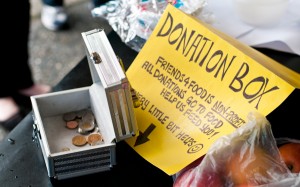
U-Pass for Kwantlen appears easier said than done
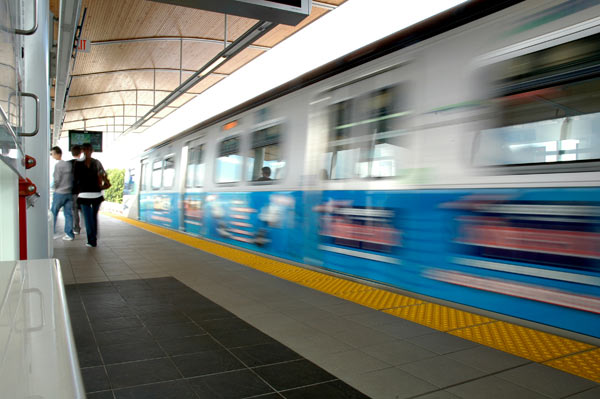
“Langley, Surrey, Delta, those communities don’t have the quality of service that other cities in the Metro Vancouver area have.U-Pass: A timeline

